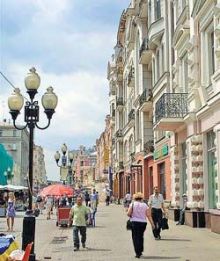Kyiv–Moscow–Kyiv – The Arbat remains quiet. It is like an independent enclave. These days, it has stopped being Moscow’s trademark, because Moscow was shattered by explosions at the hands of death bombers – and here, people are strolling around as serene as ever. They are carefree and amiable. A trademark cannot fall out of line with the general sentiment.
I cannot even remember when I was here last. Perhaps on Aug. 23, 1991, just one day before the independence of Ukraine was proclaimed, when I was coming back from London via Moscow and had to spend a day in the capital of a power which was living its last days.
By the way, it was my first trip abroad. Should anyone have told me that I would travel to Europe more often than to Russia, I would have only laughed ironically. Back then, a trip to the West was something out of this world.
During this recent visit, I was staying at the hotel of the Ukrainian Cultural Center, sitting right in this famous street. When I came back to the Arbat after researching the materials for my articles on the acts of terror, I felt as if I had found myself in a different world, a world of relaxation and joy.
While the FSB are looking for the Chechen trace, I have found a Ukrainian trace on the Arbat. You will not believe me when I say that it was not Bandera or Taras Shevchenko, nor even the presidents of Ukraine. It was a collection of Lenin’s works in 10 volumes I stumbled upon at one of the second-hand bookstores. The tiny volumes were smaller than matchboxes, and had plastic binding. A total of 1,000 copies in Ukrainian were published by the State Political Publishers of Ukraine, or, as it was then called, Politvydav. A souvenir to remember the epoch by.
Ironically, the miniature souvenir edition of the works by the founder of the communist state rested on top of the collection of the works by the destructor of the same state, Aleksandr Solzhenitsyn – in peace, without any bickering.
The Arbat in Moscow is just like our Andriivsky Uzviz. And although the atmosphere of this street has remained just as it was long ago, there still are some changes. At least, they are noticeable for me, who hasn’t been here for ages.
Today, one can see here a new monument to the man who sang “Ah Arbat, my Arbat, you’re my religion” – to the bard Bulat Okudzhava. It sits under a sort of arch which is perhaps supposed to stand for a gateway. Behind it is a metal table, also a part of the monument, and another arch covered in quotations from Okudzhava’s songs. Later I read in Wikipedia that this monument was built on May 8, 2002.
Next to it tourists have their photos taken, and they treat the bard quite offhandedly. I asked one of them, a girl, if she knew who it was. She shook her head. I don’t think that this instance allows me to generalize about the entire new generation. But one thing remains doubtless: this is a monument to a man from a different epoch. A dull, stupid epoch which was washed away, drop by drop, by Okudzhava’s humane, lyrical songs.
However, that epoch is not here anymore, albeit not completely. On the outside, there have been a lot of changes, but the epoch is still there in our minds. Actually, when I say “our” I mean not only us Ukrainians, but all the former citizens of the USSR. It is very significant that I heard shanson [a genre of Russian criminal songs as distinct from the French chancon – Ed.] played at the bard cafe Sinii Trolleibus. This cafe is in fact a trolleybus painted blue, sitting close by the monument to Okudzhava. It honors his song which said, “I jump on a blue trolleybus as it passes by. The last one, passing quite by chance.”
Normally, when I walked past the cafe, they would be playing bard songs in there. However, on the last day of my stay in the Russian capital I heard shanson. An odd combination, is it? A newfangled throwback to the realm of the exquisite bard song. I think Okudzhava wouldn’t be very happy about it. But alas, he is not with us anymore, and all those unhappy have to put up with the situation.
Yet the Arbat seems to be taking things easy. It laughs, sings, and paints. Relaxed beyond extremes as if nothing had happened.







